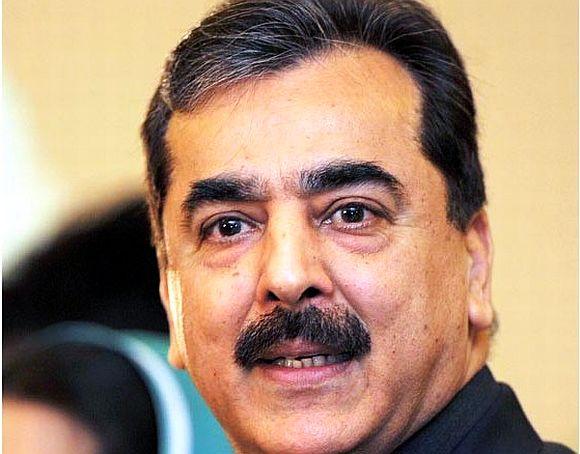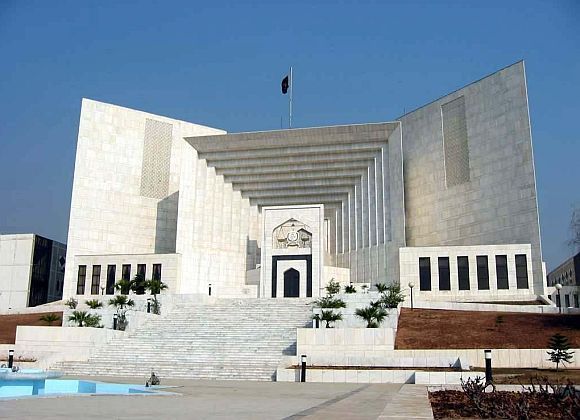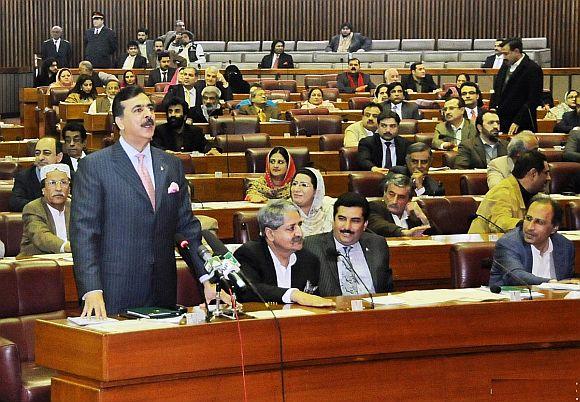 | « Back to article | Print this article |
Pak SC WILL charge Gilani with contempt
Just when the political skies in Islamabad were clearing, the Supreme Court of Pakistan has formally charged Prime Minister Syed Yousfa Raza Gilani with Contempt of Court and has summoned him once more on February 13 to frame charges against him. Amir Mir reports.
With 17 justices of the Supreme Court having already declared almost two years ago that the government must write the letter to the Swiss authorities, it was virtually inconceivable that any bench of the Supreme Court will at this stage find that the NRO judgment was flawed somehow or that it erred in its instructions.
"We are satisfied that prima facie there is enough case to proceed further in the contempt case," announced Justice Nasirul Mulk, who headed a seven-judge bench, before putting off further proceedings till February 13 for framing the charges.
The prime minister will appear in person before the apex court for a second time for not pursuing $60 million graft cases in Switzerland that also involve Zardari.
The PM made his first appearance on January 19, 2012. The abrupt manner in which the order was announced came as a surprise to many in the court room, especially to the prime minister's counsel, Barrister Aitzaz Ahsan, who was not at all expecting that the bench would suddenly terminate the hearing and pass a hasty decision.
This was despite the fact that Justice Nasirul Mulk had told the PM's counsel that the apex court would hear him till the end of the day.
Click NEXT to read further...
Pak SC WILL charge Gilani with contempt
However, hardly an hour later, the court suddenly stopped proceedings amid repeated pleas by Ahsan that he still had many things to argue and had not concluded as yet. What prompted the apex court not to proceed further was the failure in getting an assurance from the PM's counsel that a letter would be written to the Swiss authorities by the government [against Zardari].
Ahsan had argued before the court that the government would write the letter to the Swiss authorities only if the court said so and, that too, after exhausting all legal remedies. But the apex court was not convinced with this argument and thus simply announced its decision to frame contempt charges against the prime minister.
In a last-ditch effort, Ahsan sought at least 30 days' time from the court to file an intra-court appeal against the order, but the bench remained unconvinced and fixed February 13 to frame charges against the Prime Minister who used to take credit of reinstating 100-plus judges of the superior judiciary [in 2009] who had been sacked by General (retd) Pervez Musharraf way back in 2007.
Hours after being summoned by the Supreme Court, Gilani told the National Assembly that he would appear before the judges again on February 13. He made the announcement during a brief speech in which he assured the opposition parties of his government's cooperation in seeking any possible improvement in the framework for future general elections.
At the same time, however, he repeated his oft-repeated theme that all state institutions must work and remain within the limits prescribed by the constitution of Pakistan and that parliament was supreme over all others.
"I had appeared before the judiciary earlier also and now that they have called me again, I will appear before them," he said in what seemed to be a mood of non-confrontation. "But everybody should follow the constitution of Pakistan. If all institutions work in accordance with the 1973 constitution, there will be no criticism and all institution are answerable to parliament."
Click NEXT to read further...
Pak SC WILL charge Gilani with contempt
The issuance of the show cause notice by the apex court for initiation of contempt proceedings was the maiden process that was carried out on January 19 when the prime minister appeared before Justice Nasirul Mulk-led seven-member bench.
The second stage passed on February 2 when the court found Gilani having committed contempt, prima facie.
The opposition circles in Islamabad say the contempt of court case against the prime minister would have wrapped up instantly and the contempt proceedings dropped had his lawyer Ahsan committed that Gilani would write the letters honouring the December 16, 2009 judgment of the Supreme Court that nullified the National Reconciliation Ordinance.
However, the prime minister had maintained before the apex court on January 19 that he did not write the letter to the Swiss authorities against Zardari because of the fact that he enjoys presidential immunity against all criminal proceedings during the term of his office.
"According to Article 248: "(2) No criminal proceedings whatsoever shall be instituted or continued against the president or a governor in any court during his term of office... (3) No process for the arrest or imprisonment of the president or a governor shall issue from any court during his term of office", the PM had stated before the apex court while defending himself.
The government circles in Islamabad say the charge that the prime minister has committed contempt of court is arguable given the immunity clause for the president in the Constitution. Even the Swiss authorities, they say, are not ready to open those cases against the president in which he has already been cleared by the Pakistani courts.
Click NEXT to read further...
Pak SC WILL charge Gilani with contempt
Even otherwise, the Accountability Courts being run by the National Accountability Bureau (NAB) have already given immunity to Zardari in at least three cases while many other cases have not been reopened for the same reason.
However, since the prime minister has already been charged with contempt of court, the next phase of the present proceedings pertains to his defence against the charge-sheet served on him.
PM Gilani will be unable to provide any oral or documentary evidence in his protection as the matter exclusively relates to the official record and more importantly the implementation of the NRO verdict.
Experts say in the present case the judges are hardly interested in convicting the prime minister for not enforcing the apex court ruling, but want its implementation, specifically writing the letter to Swiss authorities.
However, if Gilani stuck to his stand of not sending the letter to foreign lands, he would be convicted on contempt of court charge, eventually leading to his disqualification as the prime minister of Pakistan.
While commenting on the Supreme Court's decision to charge the prime minster with contempt of court, Pakistan's leading English newspaper stats in its Friday editorial titled "Held in Contempt": What is most important at this juncture is to keep things simp#8804 to do the 'right' thing, show restraint and follow the law.
The law of our land is quite clearly written out in the Constitution -- which sets out in clear terms the role of institutions. These roles need to be adhered to if we are to avoid anarchy.
The period of 10 days set by the court should also allow the government some time to think, reflect on all that has happened and accept that the letter to the Swiss authorities must, indeed, be written if we are to see order and the continued functioning of a democracy which must move on despite the bumps it encounters along the way.
That all said, one can't help but wonder why the superior courts never held any military dictator in contempt of the Constitution".




